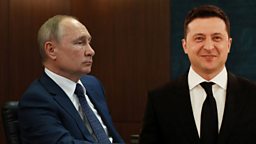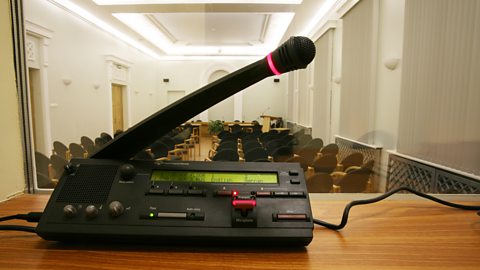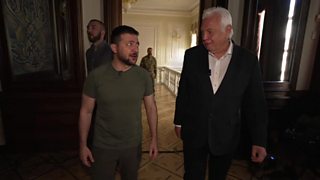When Putin and Zelensky have her ear...
You might not think of translation as a thrill-ride, but providing that service for a political speech or a court appearance with all the necessary nuance involves creativity and a high bar of risk.
In Radio 4's Word of Mouth, Michael Rosen meets freelance high-level interpreter Irina Morgan who worked for the Βι¶ΉΤΌΕΔ and its Monitoring Unit for 25 years. Being bi-lingual in Russian and Ukrainian means Irina is in demand whenever Vladimir Putin or President Zelensky give a press conference requiring simultaneous interpretation.
Irina provides a fascinating insight into how simultaneous translation works and how she conveys the respective linguistic styles of Putin, who has a distinct man-of-the-people persona, and of Zelensky, who, by contrast is a linguistic free-styler.
Word of Mouth: Interpreting Presidents Putin and Zelensky

Someone with a short attention span might be a good simultaneous translator
Irina provides simultaneous translation for high-pressure situations such as political and diplomatic meetings, conferences and court hearings. Those attending listen to her translation via an earpiece. If it’s for a news programme, she may have the “luxury of re-translating” in the edit, but much of what she does is in the moment.
The first principle of simultaneous translation is 'do no harm'.Irina Morgan
When Michael asks her what makes a good simultaneous translator, Irina says that she thinks that there is a “neurological side to it” and that people with “an innate ability of reacting quickly”, such as “people with a short attention span”, might be good at it because “they can only receive small bits of information, then they have to put them out straightaway.”
Irina hit the ground running
Rather than any neurological pre-disposition, Irina was among those who “just discover they are good at it.” Her own realisation came after graduating from Kiev Foreign Languages Institute (now Kyiv National Linguistic University) and going into journalism. At the time of the failed coup against Mikhail Gorbachev and Ukraine’s declaration of independence in 1991, she was covering the Ukrainian parliament. As there was no interpreter service there for the Western press, Irina interpreted for them. “I realised that I could actually do it in real time, and I've been doing that ever since.”
The first principle of simultaneous translation is "do no harm"
Like medicine, the first rule of simultaneous interpreting is "do no harm". Conveying the message is the “minimum standard”, says Irina, “and then after that, of course, a good simultaneous interpreter will also project the flavour, the manner of speaking and the idiomatic use of language.”

Just the right amount of history is useful
A knowledge of history can come in handy for a translator. Irina recalls President Zelensky’s world tour of parliaments and his mention of the Berlin Airlift in the German parliament. “But in Ukrainian,” says Irina, “it's like the ‘Berlin Air Bridge’, and, of course, I grew up in the Soviet Union and we were not taught about the Berlin Airlift because it wasn't a favourable moment in their history. So it didn't come to me automatically, and I just said ‘Air Bridge’."
Occasionally, knowing too much history can be a disadvantage. When President Zelensky was speaking to the Danish parliament, Irina asked her husband, who has a degree in history, what references Zelensky might bring up. Possible historical events were suggested but, in the end, the homegrown reference Zelensky used was "hygge", the Danish word for cosy, but specifically in relation to lighting candles for the victims of the war in Ukraine.
President Zelensky is a stream-of-consciousness speaker
Though he was once a comedian, President Zelensky has, it seems, deliberately put behind him anything that could be seen as throwaway or gaggy – but he still riffs. “He speaks like a jam session in jazz,” says Irina, “He starts somewhere and then goes into a lot of sub-clauses and very long sentences and explains things in a very unorthodox manner. He takes things very emotionally so grammatically it's quite difficult to interpret him – he's quite a challenging subject.”

Putin speaks like a macho "man of the people"
Simultaneously translating President Putin is a different kind of challenge. Putin doesn’t shy away from vulgar language for a start. For example, speaking about NATO last year he was been interpreted as saying “they screwed us over”. At the St Petersburg International Economic Forum this year he told the audience that countries talking about nuclear arms reduction could “shove it”.
Meanwhile, talking of the agreements after the invasion of Crimea, Putin has said: “Whether you like it or not, you have to put up with it, my beauty.” This is a phrase seen as misogynistic but also, says Irina, an example of using “street language, very informal, almost gangster-like expressions” to project the image of a “macho man in control”. Irina adds: “He always uses a new idiom, and so we're always a bit on edge when we're translating him.”
Notably, Irina observes that Putin only uses these expressions “when he feels relaxed”. After the Wagner Group’s attempted coup in June, Putin didn’t reach for any of these kinds of idiom, “and that tells me he wasn’t completely in control”.
Translators can be part of courtroom action
Irina thinks that simultaneous translators do enjoy the risk of their work. “There’s a bit of a gambler in all of us,” she says. Certainly, delivering simultaneous translation of two of the most important figures in world affairs gets the adrenalin going, but the highest stakes often occur when they are working in courtrooms.
Precision is key in this situation, but even where the translation is flawless, the translators might find themselves part of the proceedings. “Sometimes witnesses will play for time to think about their answer,” explains Irina, “and they say, ‘Oh, I'm not sure I understood the translation. Could you repeat that, please?’"
Meanwhile, barristers can also use translations as part of their arsenal. “If they don’t like how the witness handled the question they will say to the judge, ‘My Lord, I'm sure this wasn't the right translation because my witness said this. But what I heard was this…’”
“Sometimes that's genuine,” says Irina, “because yes, we are all fallible, but sometimes it's not as they're either playing for time or they're being adversarial.”

Irina Morgan: the art of simultaneous translation
Translating Michael Rosen live into Russian, and secrets of interpreting Putin.
-
![]()
Listen to Word of Mouth: Interpreting Presidents Putin and Zelensky
Irina Morgan talks to Michael Rosen about the language do's and don'ts of live translation, and about how she puts herself into the mindset of someone like President Putin in order to give an accurate representation of his distinct man-of-the-people hard man linguistic style. By contrast Volodymyr Zelensky is a linguistic free-styler – like following jazz, Irina says. A fascinating look at the life of a language specialist.

Further listening on Radio 4
-
![]()
Word of Mouth
Radio 4's popular series exploring the world of words and the ways in which we use them, with Michael Rosen.
-
![]()
Putin
Jonny Dymond tells the extraordinary and revealing story of Vladimir Putin's life with the help of guests who have watched, studied and dealt with the Russian president.
-
![]()
Profile: Volodomyr Zelensky
Zelensky was an actor and comedian who became a household name in Ukraine by starring in a TV series about a teacher who accidentally became president. In a surreal case of life imitating art, Zelensky found himself elected in 2019 with zero political experience.
-
![]()
The Media Show: Interviewing Zelensky
As the war in Ukraine continues to escalate, what role does journalism play in peace-making, in dialling down the rhetoric? The Βι¶ΉΤΌΕΔ’s John Simpson interviews President Zelensky – we’ll hear his take.





